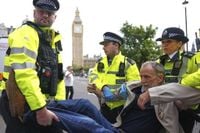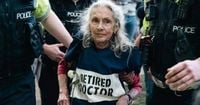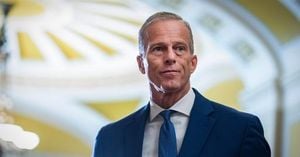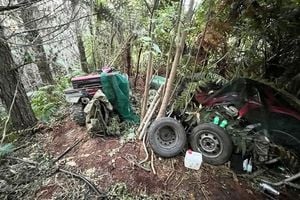On Saturday, September 6, 2025, central London became the epicenter of a dramatic confrontation between British authorities and hundreds of demonstrators protesting the government’s recent ban on the activist group Palestine Action. The Metropolitan Police confirmed that 890 people were arrested during the protest near Parliament, marking one of the largest mass arrest operations in the city’s recent history. The demonstration, organized by the campaign group Defend Our Juries, drew an estimated 1,500 participants, many of whom sat down in Parliament Square holding signs that read, “I oppose genocide, I support Palestine Action.”
The events unfolded just two months after the UK government, under the Labour administration, proscribed Palestine Action as a terrorist organization under the Terrorism Act 2000. This unprecedented move followed a high-profile incident in July, when Palestine Action members breached the Royal Air Force Brize Norton base and vandalized two military aircraft, causing an estimated £7 million in damages. Officials argued that these actions, and others targeting British defense companies with ties to Israel, crossed the line from protest into criminality and justified the group’s proscription.
Under the new classification, supporting or being a member of Palestine Action is a criminal offense punishable by up to 14 years in prison. The ban placed the group in the same legal category as al Qaeda and Islamic State, making it the first direct action group to be proscribed as a terrorist organization in the UK. Since the ban took effect, more than 1,600 people have been detained for supporting Palestine Action, many for silently holding signs or attending rallies.
Saturday’s protest quickly escalated as police began making arrests within minutes of the demonstration’s start. According to police figures, 857 people were detained under anti-terror powers for supporting the proscribed group, while another 33 were arrested for separate offenses, including 17 for assaulting officers. Deputy Assistant Commissioner Claire Smart described the situation as volatile, stating, “The violence we encountered during the operation was coordinated and carried out by a group of people ... intent on creating as much disorder as possible.” She also reported that officers were “punched, kicked, spat on and had objects thrown at them by protesters.”
However, Defend Our Juries and many protest participants strongly disputed the police account. Organizers described the gathering as “the picture of peaceful protest,” noting that those arrested included clergy, military veterans, healthcare workers, elderly people, and some with disabilities. The group accused authorities of using terrorism legislation to intimidate the public and suppress solidarity with Palestine. “These mass acts of defiance will continue until the ban is lifted,” a spokesperson declared, emphasizing the movement’s determination to challenge what they see as an attack on free expression and civil liberties.
The logistical challenges of the mass arrest operation quickly became apparent. Detainees reported being left in police vans for hours, with some waiting in queues along Millbank until the early hours of Sunday before being processed. Many were transported to police stations across London and even as far as Wales and Scotland. According to one arrestee, police officers could be overheard complaining about canceled leave, mandatory overtime, and being stranded far from their home bases after 20-hour shifts. “After arrest, I was in the processing queue along Millbank from 10pm to 2.30am. My arrest was one of the last, so by that stage, there were far more cops than prisoners, loads of them hanging about with little to do apart from chat in small groups,” one protester told Middle East Eye. The exhaustion and frustration among officers was palpable, with some expressing discontent about arresting pensioners and disabled people instead of what they considered “real criminals.”
The Police Federation, representing rank-and-file officers, warned that the current pace of protest policing is unsustainable and risks causing widespread burnout within the Metropolitan Police. “We must remember there are no 'extra' police officers to police these weekly and seemingly escalating number of protests. Just the same hard-working ones having their days off cancelled, having to work longer shifts and being moved from other areas. Our colleagues are emotionally and physically exhausted,” a spokesperson said.
The government, for its part, has staunchly defended its decision to proscribe Palestine Action. Defence Minister John Healey rejected accusations of a two-tier policing and justice system, stating on Sky News, “Almost everyone shares the agony when we see the images from Gaza ... and for people who want to voice their concern and protest, I applaud them. But that does not require them to link it to support for Palestine Action, a proscribed group.” Former Home Secretary Yvette Cooper argued that the ban was necessary, stating, “The assessments are very clear, this is not a nonviolent organization.”
Yet, the ban has drawn sharp criticism from human rights organizations, legal observers, and the United Nations. Volker Türk, the UN human rights chief, warned that the new law “misuses the gravity and impact of terrorism” and “raises serious concerns that counterterrorism laws are being applied to conduct that is not terrorist in nature, and risks hindering the legitimate exercise of fundamental freedoms across the UK.” According to international standards, Türk emphasized, terrorist acts should be limited to crimes intended to cause death or serious injury or the taking of hostages.
Palestine Action’s co-founder, Huda Ammori, called the government’s decision “catastrophic” for civil liberties, arguing that it has created a “much wider chilling effect on freedom of speech.” The group has challenged the ban in the High Court, winning approval for a judicial review that is scheduled for a hearing on September 25. In the meantime, supporters—including prominent figures like bestselling author Sally Rooney—have pledged to continue backing the group and direct action against what they describe as genocide in Gaza.
While ministers insist that the ban does not restrict other lawful groups from protesting or expressing pro-Palestinian or pro-Israel views, activists fear that even peaceful demonstrations could now bring them into conflict with the law. The arrests carry potentially severe penalties: most individuals charged with supporting a proscribed group face up to six months in prison, while organizers could face sentences of up to 14 years.
Saturday’s dramatic events unfolded against the grim backdrop of the ongoing conflict in Gaza. Since October 2023, over 200,000 Palestinians have been killed or wounded, with more than 80 percent of those killed reported as civilians, according to Israeli military intelligence data cited by Middle East Eye. Israel has vehemently denied accusations of genocide, insisting its actions target Hamas and other militant groups.
As London’s streets emptied in the early hours of Sunday, the debate over the boundaries of protest, the definition of terrorism, and the future of civil liberties in Britain remained far from settled. The mass arrests have become a flashpoint in a broader struggle over rights, security, and the limits of dissent in a democracy under strain.





